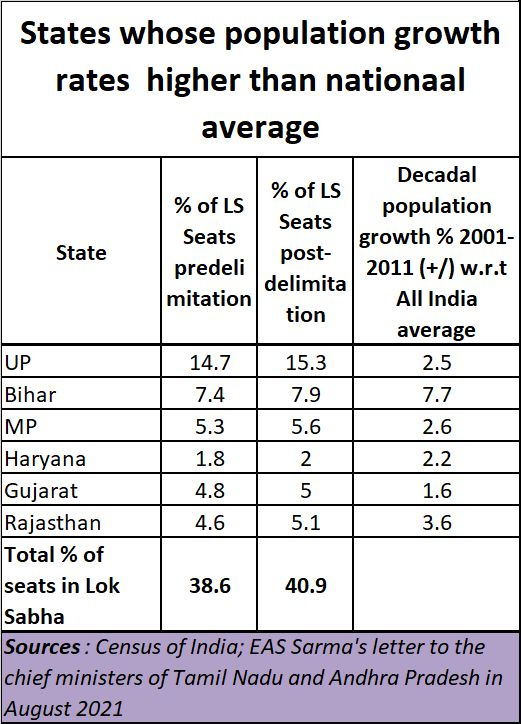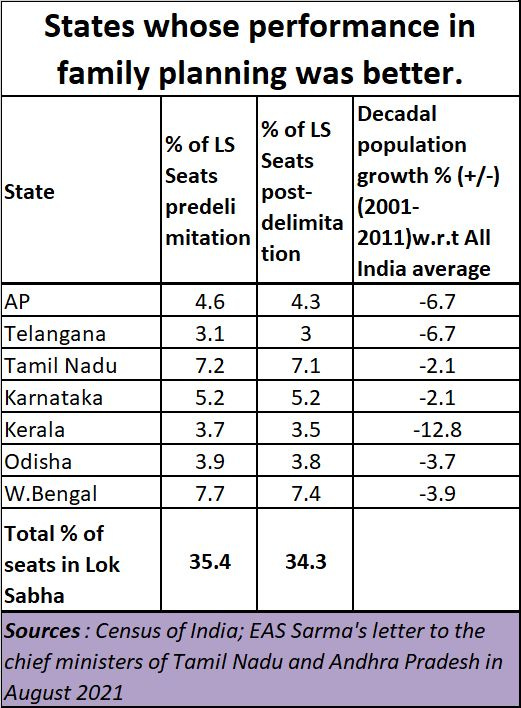The battle for constitutional voice and democracy
Southern states could feel marginalized in gaining a constitutional voice
Policy Watch
In the Bing generated image above, the onlooker observes how pygmies try to weigh down a larger and more powerful person. That can be a terrible tragedy when the big and powerful are sought to be pulled down by pygmies.
On 14 February, 2024, Tamil Nadu made history by passing two first-of-their-kind resolutions in the State Assembly (https://www.theweek.in/news/india/2024/02/14/tamil-nadu-passes-resolution-against-delimitation-one-nation-one-election.html). One resolution was against the Union government’s initiative to implement ‘One Nation, One election’. The other was against the proposed delimitation of Parliament and Assembly constituencies in 2026 based on the to-be-held Census.
Missing Census
It is worth mentioning here that the government has delayed the Census 2021, and now proposes to have them after the elections this year. That is terribly unfortunate because the entire economic planning of this country is being implemented based on data relating to the 2011 Census and earlier data findings (free subscription -- https://bhaskarr.substack.com/p/indias-election-peril-aadhaar-and?sd=pf).
As EAS Sarma, social activist and former Secretary to the Government of India points out (https://bhaskarr.substack.com/p/eas-sarma-asks-home-ministry-not?sd=pf): “The first Census in India was conducted as early as in 1881 and it was repeated at the beginning of every succeeding decade without a single instance of interruption, till the present government chose to defer the 2021 Census, presumably in the name of the two difficult Covid spurts during 2020 and 2021.”
But if the country can prepare electoral rolls for the 2024 elections, is it that difficult to complete the Census exercise. It would therefore appear that it was a matter of intent (for whatever reason one may attribute to the policy makers) than the onset of Covid.
Tamil Nadu registers formal protests
The absence of data on the actual state of population, leaving the country with mere estimates, and the onset of the threat of delimitation, are what provoked the Tamil Nadu state government to pass the two resolutions.
The threat of delimitation is a serious matter because, as Sharma pointed out in his letter to the chief ministers of Tamil Nadu and Andhra Pradesh in August 2021 (https://asiaconverge.com/2021/08/delimitation-of-indian-states-and-rewarding-the-hindi-belt/) , “The legal position is as follows.
“The Constitution Act, 2001 and the Constitution (Eighty-seventh Amendment) Act, 2003 have, inter alia, amended Articles 81, 82, 170, 330 and 332 of the Constitution of India. The cumulative effect of these amendments to the Constitution is that –
the total number of existing seats as allocated to various States in the House of
the People on the basis of 1971 census shall remain unaltered till the first census to
be taken after the year 2026.the total number of existing seats in the Legislative Assemblies of all States as
fixed on the basis of 1971 census shall also remain unaltered till the first census to
be taken after the year 2026.”
Population matters
Moreover, the way many states have not been very successful in controlling the number of births in their respective territories has caused a further twist in this story.
As Sarma points out, many of the states had birth rates that were higher than the national average. Effectively, any exercise to assign the number of parliamentary seats based on population would favour these states that have been either ineffective or irresponsible. Conversely, such a move would penalise states that have been more effective and successful in controlling population growth in their respective territories. The data compiled by Sarma, confirms the difference between the successful Southern states compared to the performance of states like Uttar Pradesh, Madhya Pradesh, Haryana, Gujarat, and Rajasthan.
Don’t penalise well-performing states
As the table shows, the Southern states in addition to Odisha and West Bengal have actually registered population growth rates which are lower than the national average. Coincidentally, and this adds to the worry, all these states are non-BJP states.
What this means is that the delimitation exercise could reduce the voting share of such non-BJP states, and enhance the share of those states that are controlled by the ruling party.
The states which have not managed their population growth well could see their constitutional clout increase from 38.6% of total seats to 40.9. Conversely, southern states, Odisha and West Bengal could see their representation shrink from 35.4% to 34.3%. Not surprisingly, many of these states have expressed their annoyance with such moves. But Tamil Nadu has made its opposition formal, by passing a resolution against such moves. The fact that the delimitation scheme itself was based on constitutional amendments could go to the courts to review such amendments as well.
Whether other states take the same step as Tamil Nadu has remains to be seen.
Contributions to the exchequer
There is another issue that is worrying. This involves the way the government will be penalising the very states that have been major contributors to the National Exchequer.
Consider the following:
According to the RBI, the combined collection of own taxes by the Hindi Belt states was just 22% of the total compared to 33% for the Southern states. What this means that the states which have helped India grow faster are now being penalised and their constitutional clout is sought to be reduced.
Maharashtra and Gujarat have also been major contributors to the national exchequer, but these states have not been heard complaining about the delimitation exercise. However, Gujarat has allowed its population to grow faster, hence will remain a beneficiary under the delimitation plans, while Maharashtra, which has controlled its population better will see its constitutional representation shrink. It will not be surprising, therefore, if Maharashtra, West Bengal, and Odisha too begin to make louder protests, in view of the resolutions passed by the Tamil Nadu assembly.
The Tamil Nadu resolution stated: “This August House urges the Union Government that the delimitation process to be conducted after 2026 on the basis of the census should not be carried out. Due to unavoidable reasons, if the number of seats on the basis of the population were to increase, it shall be maintained at the present ratio of the constituencies between the States in the State Assemblies and both Houses of Parliament fixed based on the population of 1971.” Pointing out that both Tamil Nadu and Bihar had similar populations in 1971, Stalin said in the past five decades, Bihar's population has surged to over one-and-a-half times that of Tamil Nadu.
“Already, with 39 MPs, we are begging. If numbers drop, what will happen?” he asked.
No one-nation-one-election
The ‘one nation one election’ policy, Stalin urged the Union government to drop the ‘one nation one election’ plan. He said that such a move is against the “basis of democracy; impractical; not enshrined in the Constitution of India.” Stating that it was against the “idea of democratic decentralisation,” the chief minister said elections to the local bodies, State Assemblies and Parliament are being held at different times on the basis of people-centric issues in a vast and diverse country like India.
He described the 'One Nation, One Election' proposal as 'autocratic' and a 'conspiracy'. He argued that both proposals would adversely impact democracy and asked the opposition to unite against them (https://www.indiatoday.in/india/story/tamil-nadu-assembly-one-nation-one-election-delimitation-exercise-mk-stalin-dmk-2502192-2024-02-14).
The missing Census, the proliferation of Aadhaar cards, the proposed one-nation-one-election, and the planned delimitation exercise ae bound to raise key policy issues. These range from economic performance, generation of resources, education, health, allocation of funds to the most inept, and managing human development indices (https://bhaskarr.substack.com/p/the-hallucinations-underlying-the?r=ni0hb&utm_campaign=post&utm_medium=web).
Expect political temperatures to soar in the coming months.
The author is a senior journalist and researcher








Apprehensive the centre's brazen step-motherly treatment of southern states will once again make the ugly head of secessionist movement rise.